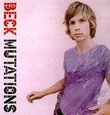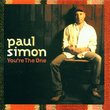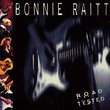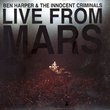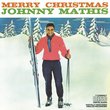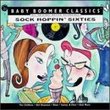| All Artists: Miles Davis Title: Someday My Prince Will Come Members Wishing: 2 Total Copies: 0 Label: Sbme Special Mkts. Release Date: 4/29/2008 Genres: Jazz, Pop, Broadway & Vocalists Styles: Cool Jazz, Bebop, Cabaret Number of Discs: 1 SwapaCD Credits: 1 UPC: 886972670027 |
Search - Miles Davis :: Someday My Prince Will Come
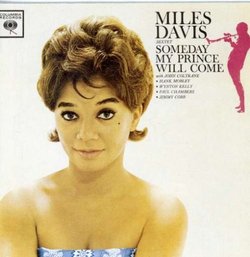 | Miles Davis Someday My Prince Will Come Genres: Jazz, Pop, Broadway & Vocalists
Miles Davis, Someday My Prince Will Come |
Larger Image |
CD DetailsSynopsis
Album Description Miles Davis, Someday My Prince Will Come Similar CDs
Similarly Requested CDs
|
CD ReviewsNice, but not a classic G B | Connecticut | 05/10/2008 (4 out of 5 stars) "There are those times in jazz when everything is pattering along, nice and pleasant, and then one musician starts playing and BOOM everything that's happened for the previous few minutes seems totally trivial. "Someday My Prince Will Come" (track #1 of this CD) is one of those times. Miles, Hank Mobley, and Wynton all play fine swinging solos; then John Coltrane plays an incredible solo at the end of which you ask yourself "Hank who?" Most of this CD features Miles's working band of the time, a quintet with Mobley in the tenor sax chair and the superbly groovy rhythm section of Wynton Kelly, Paul Chambers, and Jimmy Cobb. Mobley was a fine hard bop player, as some of his albums for the Blue Note label attest to (check out Soul Station, Roll Call or Workout), but he sounds a little uncomfortable here. The music looks back behind the progressive sounds of Kind of Blue and Milestones to the mid-50s quintet, though with a few exceptions it doesn't have the spark of that group. The exceptions include the two tracks with Coltrane ("Someday" and "Teo"), whose intense spiralling improvisations look ahead to those on "Ole" and "Africa"; the one track with Philly Joe Jones ("Blues #2"), where Miles and Philly Joe trade choruses almost telepathically; and "Pfrancing" (aka "No Blues"), where the rhythm section does what they do best. The ballads, played by Miles on mute, are a little anemic. The music on this album will please almost any jazz fan and includes some classic performances, but there are quite a few Miles Davis recordings that are more essential. If you want to hear the quintet (minus guests) at their best, check out the recently issued Friday and Saturday Nights at the Blackhawk. [This review is based on the 1999 reissue, which has excellent sound and an identical tracklist.]" Flawed masterpiece (and more masterful because of the flaw) Samuel Chell | Kenosha,, WI United States | 06/15/2008 (5 out of 5 stars) "Basically, I think G.B., the previous reviewer, gets it right. This one definitely isn't as immediately satisfying (especially to a Mobley fan like me) as "Friday and Saturday Nights at the Blackhawk," but it's still a welcome recording (and 2008 reissue) that captures Miles precisely at the moment of transition (between Coltrane and Mobley). Moreover, my hunch is that this recording will increasingly be appreciated as the years accumulate, possibly even coming within striking distance of an indisputable masterpiece like "Kind of Blue," once listeners attend less to the surrounding circumstances (2 Davis alumni sitting in on 3 tracks) and listen to the nearly uniform excellence of the music. Unfortunately, Mobley got "blind-sided" on the title tune, thanks to the curious decision of Miles to introduce Coltrane as a second tenor just as the listener is "suckered" into thinking the leader has taken the tune out. A number of listeners immediately interpret the obvious disparity between the two tenor giants as either a sign of Coltrane's unassailable superiority or Mobley's middleweight mediocrity. But that's terribly unfair to Mobley, who was neither a motivic power player like Rollins nor an incantatory harmonicist like Coltrane. There's no more lyrical, ceaselessly melodic, soulful, blues-rooted, naturally gifted player than Mobley who, at his best, simply took the chords that were given him and "sang" his heart out. On the first track Hank is clearly self-conscious about his role, practically "auditioning" for a place in the Miles Davis Quintet. Moreover, he's following the economical, pungent and tight-lipped, ultra-attitudinous and cool solo by Miles. Hank uncharacteristically "deliberates" about his note choices, leading to several silences of almost a full measure (such unheard moments are unheard of for this intuitive, natural singer). The alternative version of the title track, on which Coltrane sits out, finds Mobley back in stride, no longer trying to match the leader's laconic intensity but submitting two choruses of unbridled, unhesitating yet resourceful lyricism. All the same, I'm glad Columbia elected to go with the Mobley-Coltrane incongruity on the original release. It's Coltrane's entrance on the title tune that elevates the proceedings which follow to the level of another Miles masterpiece. Through much of the ensuing music Mobley provides the earthy warmth to counteract Miles' steely Harmon-muted tones and poignant coldness, whereas Coltrane's is the only horn that could follow Miles on "Teo," a Flamenco, or Mid-Eastern, modal number on which the trumpeter revisits his upper-register cadenza work from "Sketches of Spain." Not the least of the rewards of this reissue is "Blues No. 2," not included on the original release but the one tune on which Philly Joe Jones replaces Jimmy Cobb, sounding--almost as much as Coltrane--like a man on a mission. Whereas Cobb plays with a broad stroke and resonant ride cymbal, creating open swinging spaces for the soloist to explore, Jones has a short, tight stroke, perfect for the crisp, quick conversations he engages in, seemingly favoring his snare over his ride cymbal. And whereas a Max Roach would often conduct a polyrhythmic kind of "counter-chatter" to the soloists, Philly Joe is more like a horn player himself, his phrases intricate but relatively symmetrical--employing the same bebop licks as those favored by the idiom's chief non-percussion exponents. In fact, listening to Miles and Philly Joe on this track is a little like hearing some of the sparring matches between Diz and Bird! Consider this one an essential addition to any jazz library, even if its initial appeal is admittedly to a curious streak (if you want to hear Mobley playing with Coltrane, and having a fighting chance, pick up Johnny Griffin's "A Blowin' Session" or, better yet, "Two Tenors" or "Tenor Conclave"--both, originally at least, under Mobley's name)." Surprisingly, excellent Black Dog | Seabrook, TX | 08/03/2009 (5 out of 5 stars) "In a very short time, this has quickly become one of my favorite Miles Davis CD's. This is unexpected in that this CD is from a time when Miles was transitioning band members without a whole lot of stability. The album has "someday my prince will come" which is attractive to those who would like to hear Miles' common standards. The album also has some striking lesser know original numbers which are unique in harmony and form. These are "pfrancing" and "teo". The music matches the pre-"kind of blue" time in that the open modal forms are not as present (which Miles would lean to later with "ESP") and seem more like his Prestige recordings though this album was recorded in 1961."
|

 Track Listings (8) - Disc #1
Track Listings (8) - Disc #1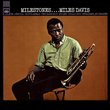

![Sly & the Family Stone - Greatest Hits [Epic]](https://nationalbookswap.com/cd//m/63/8263/18263.jpg)
